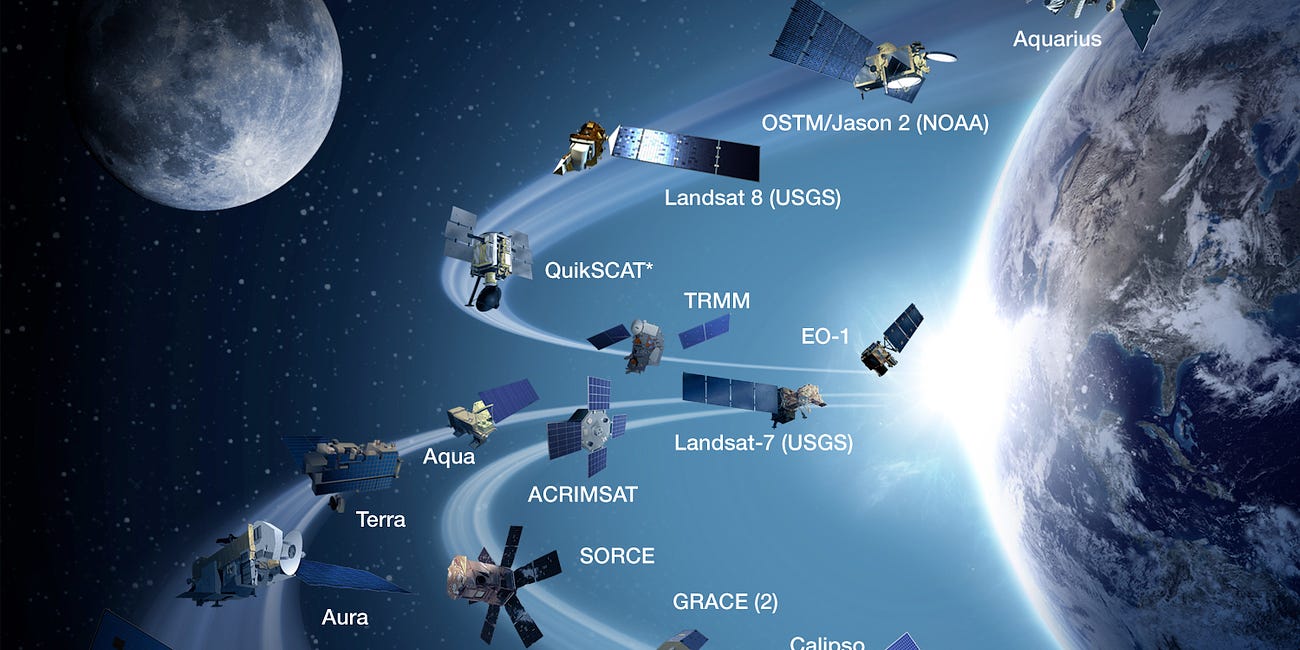Sleepy Astronomers; Ruining Notepad; Uneducated Use of AI
Wednesday Brief - November 13, 2024
Better Late than Never
More than 100 astronomers signed a letter dated October 24, 2024, in which they stated:
We shouldn’t rush into deploying an untested and under-researched technology into new environments without comprehensive review.
They were specifically targeting SpaceX, which has launched “more than 6,000 units” in the last five years, “and now make up more than 60% of all satellites.”
I made this point more than a year and a half ago, writing (in the article linked at the top):
This low-orbit sphere of space junk will inhibit optical and radio observations, increase the odds of a catastrophic space collision, inhibit other more important space launches (GPS satellites, manned space missions, etc.), create a regular shower of molten metal into the atmosphere, or prohibit space travel altogether. Starlink has already experienced one major failure—a Geostorm in early 2022 destroyed 40 Starlink satellites almost simultaneously.
The astronomers apparently agreed, concluding:
New large scale technologies require oversight and study. The long term effects of this massive change to our environment aren’t clear. What is clear is that we can bring the world online without the unknown environmental harms of satellite mega-constellations. The FCC should coordinate closely with the EPA, NASA, and other national and international regulators to require extensive environmental reviews for the new space age. We’re in a short window of time when we can prevent making a mess of space and our atmosphere rather than spend decades cleaning it up.
The new space race doesn’t need to create massive space waste.
I suppose calling for a pause now is better than never doing it, even if it is rather late. We shall see if it has any effect.
Microsoft Notepad AI
Like seemingly everything else, Microsoft’s Notepad is getting artificial intelligence injected into it. Notepad has been around since 1983, and was originally intended solely as a text editor. Now it will include AI to help rewrite sentences to improve tone, phrasing, and length. Microsoft already has MS Word for this kind of process, and it is the program that is typically used for producing documents the user intends to give to other people.
To use this feature in Notepad, users will need a Microsoft account because it is “powered by a cloud-based service that requires authentication and authorization.” Putting it plainly, Microsoft is moving toward forcing you to create an account to scribble notes. And if historical trends are any indicator, ‘free’ accounts rarely remain that way.
This seems like yet another spurious attempt to insert AI where it is unneeded. It is an effort to force consumers into paying for even basic services that were long free (or at least paid for in the price of a computer). It is part of the continued attempt to establish as fact the myth that AI will save the world and “make everything better.”
Instead, as I have discussed repeatedly before, AI consumes vast amounts of resources, so its unnecessary application presents a growing environmental threat. It tends to lack sophistication due in large part to its incomplete development and premature release. Notepad’s AI injection is yet another example of the move toward the enshittification of technology that once represented the ingenuity and progress of humanity.
Another genius use of AI
Instances of using AI to perform functions best left to humans are on the rise. The lesson is simple—AI is not a viable option for people wanting to be lazy. In the latest case, the US state of Alaska’s Education Commissioner Deena Bishop found this out the embarrassing way.
The department of education was mulling over banning children from carrying cellphones in schools. The report in which Bishop articulated her reasoning for the ban contained six citations to studies identified by a request to AI, four of which were completely fictitious. It was obvious that she did not bother to review the studies, given that one cited did not even discuss cellphones.
What this episode reveals is that Bishop simply wanted to ban cellphones, irrespective of any intelligent basis. The fact that one of the studies cited does not address cellphones at all indicates that she had no intention of discerning whether her decision rested in any scientific principles. AI-generated or not, she never planned to read any studies. Instead, she merely wanted to make her decision look intelligent, carefully researched, and supportable by scientific studies.
What Bishop did as the head of the Alaska Board of Education, plain and simply, is lie. It is the ultimate breach of ethics that should lead her to resign. After all, Section 2.2 of the Board’s bylaws demands that students “Exemplify the best values of society.” Shouldn’t the Commissioner of Education do the same? Surely, she could have identified pragmatic reasons for banning cellphones in school, such as that teachers find them distracting or children use them to cheat on tests. Perhaps the problem is that she could not find evidence behind such justifications or had no desire to look.
Instead, because she knows that decisions supported by evidence are intrinsically more rational, she created an imagined scientific backing for what she probably recognized as an emotional rather than a sensible decision. Now, she looks like a fool—irrespective of whether her decision is still implemented.
The lesson? Don’t take the road of laziness and cheat. It may work for awhile, but it only requires getting caught once to torch your reputation. The Alaska Daily News editorial board summed it up:
Bishop’s citation-fabrication faux pas is that it displays a lack of maturity in the ways we use artificial intelligence… And, whether the person using AI is a student creating an outline for an essay or an education commissioner looking to brief the state school board on policy, we would be wise to double-check what it tells us, lest we end up embarrassed by our naive reliance that the friendly machine spitting out suggestions would never lead us astray.
The Alaska Daily News is correct. So, the question becomes, do Alaskans want an immature person in charge of their children’s education?






